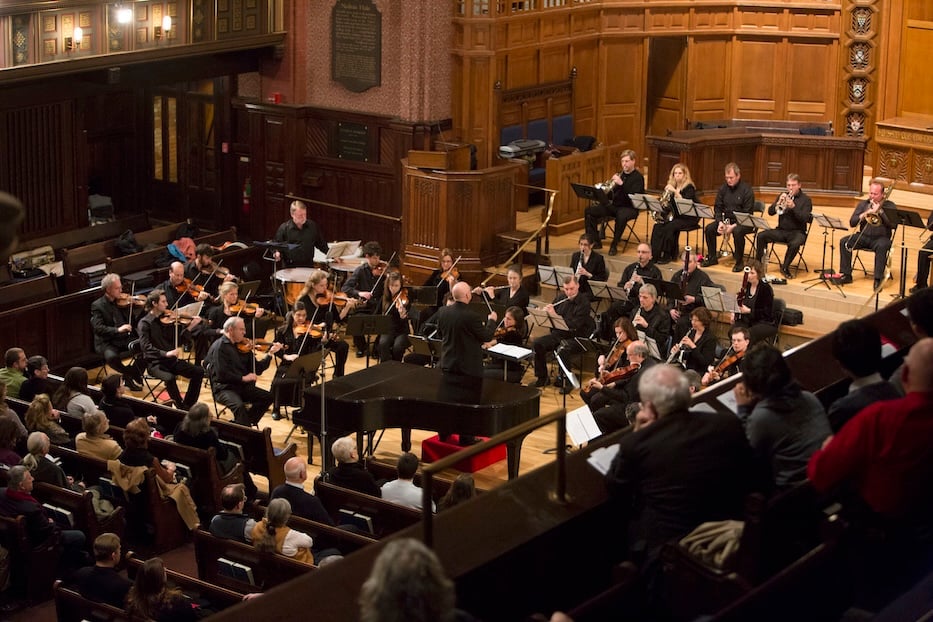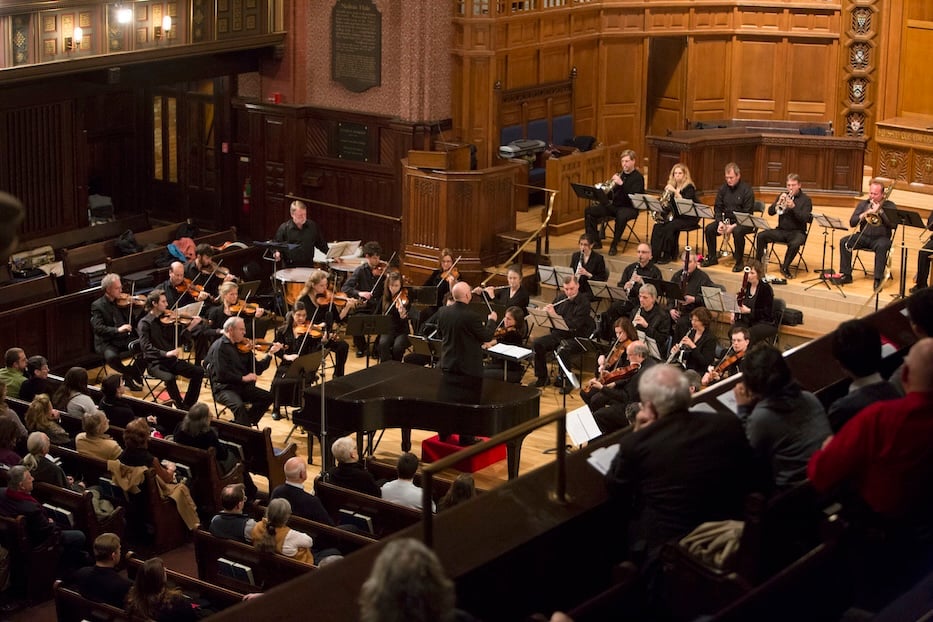
Music | Arts & Culture | WNHH | Orchestra New England

Photo courtesy of Orchestra New England.
The first time he stood before Orchestra New England on Woolsey Hall’s main stage, Maestro James Sinclair didn’t imagine that the group would last for five years. Now, he is preparing to conduct it into its fifth decade.
That milestone is coming to New Haven this year, as Orchestra New England plays into its 50th anniversary year with a concert that revisits its mellifluous roots in New Haven. After a successful performance at the United Church on the Green in November of last year, that show will take place in March, celebrating the life and work of composer Charles Ives in his own sesquicentennial birthday year.
“Ives’ music is very much about us,” said Sinclair, who has made New Haven his home since 1972, on a recent episode of WNHH Community Radio’s “Arts Respond” program. “It’s about the holidays, about New England, about Connecticut, about Danbury—it’s about America, which Ives embraced.”
“His music has an immediacy, a meaningfulness to us,” he added. “It brings back another time.”
Orchestra New England was born in 1974, just two years after Sinclair moved to New Haven to become an assistant professor of music and a lecturer at Yale University At the time, he had finished his studies at Indiana University, and was elbow-deep in the Charles Ives Papers, delighting in a collection of short, largely unpublished musical works from the Connecticut-born composer.
What stood out to him, he remembered, was Ives’ distinct style. Born in Danbury in 1874, Ives was one of two sons of Mary Parmelee and George Ives, the latter of whom was a bandmaster during the Civil War. While the war had ended by the composer’s birth, its sonic imprint remained: Ives folded its marches and two-step dance rhythms into his affinity for Americana, classical music and evolving folk music, creating a sound that was distinctly his.
After finding the works in Yale’s archives, Sinclair gathered a collection of colleagues to come together and read the pieces for fun. It was an entirely volunteer-led effort, he remembered—and left them all totally delighted. “We were shocked at how fascinating and diverse and fun this music was,” he recalled. No one knew it then, but the tender seeds of Orchestra New England had been planted.
Using Yale’s chamber music program as a launch pad, Sinclair and several colleagues mounted a concert at Sprague Hall in March of 1974, calling the ensemble the Yale Theatre Orchestra. As they played an all-Ives program for a capacity crowd, the audience “flipped out,” Sinclair remembered. “They couldn’t imagine they were hearing the premieres of 14 pieces in that concert.”
At the time, it was meant to be a one-off, a celebration of a composer’s life and work 100 years after his birth in the same state.
But the concert was a mellifluous gift that kept giving. In the audience, there was a producer from CBS Records International, now recognized under the Sony Records umbrella. After the show, he jogged onstage and offered the group a recording deal in time for the centennial of Ives’ birth. Within two weeks, the orchestra was recording all 14 pieces. By that summer, an album from the group was out in the world. Sinclair, aware of Ives’ vast body of work, began thinking about a fall program with over a dozen more premieres.
There weren’t yet whispers of a potential nonprofit, or a board of directors. Musicians were still volunteering their time, working around studio practices, undergraduate and graduate studies, and teaching loads to make the music work. But in 1975 and then 1976, Orchestra New England expanded its footprint, adding names like Igor Stravinsky and Joseph Haydn to their roster. And then, mostly because musicians were having fun together, it kept going.
At the time, Sinclair was most interested in “works that no one else was playing that needed to be heard,” he said. “They were important [pieces of] music.” Musicians split whatever the group earned from ticket sales, bringing in extra dollars from the Music Performance Trust Fund (MPTF). At some point, it occurred to him that the group should start a board of directors and seek nonprofit status. Sinclair, who stressed the importance of unionized musicians in the process,
“We really owe it to the players, being willing to hang through that transition,” he said. “I would not want to steer those straits of magellan again. But the players made it possible.”
He added that the dedication of several of those players has kept him coming back year after year. Like Sinclair, pianist Gary Chapman has been with the group since the very beginning. Bassoonist Gary Bennett has played with the group for 49 of 50 years. Concertmaster Raphael Ryger, who joined the group in 1982, has been in his role since 1988. Grammy-nominated teacher Patrick Smith, who teaches at Cooperative Arts & Humanities High School, entered as the group’s principal percussionist in 1991.
Along the way, the group has grown its musical footprint, building several traditions for which it is now known in both New Haven and the greater New England and Northeast region. Forty-four years ago, the orchestra added an annual “Colonial Concert” to its roster, celebrating the music of the late 18th century with costumes, powdered wigs, candlelight and a broadcast that made it to public radio. By the concert’s second year, the Southern New England Telephone Company (SNET) was interested in broadcasting the performance.
Since then, the group has played across the East Coast, recording several of Ives’ works, as well works like Cole Porter’s Fifty Million Frenchmen and Heitor Villa-Lobos’ folk operas. This year, the group will return to its birthplace at Sprague Hall in March, followed by a recording of that concert and several of Ives’ orchestral works two weeks later. “It’s an honorable project and we’re thrilled,” Sinclair said.
In other words, he added, there’s no reason why he would want to leave the New Haven or the orchestra, which ranges in size from 10 to just over three dozen during a given performance. Besides, New Haven is his home, and home to all but one of Ives’ works. With the exception of a folio that lives in New York, the composer’s collection lives entirely at Yale.
“I need to be in New Haven,” he said. “I never thought about leaving. The orchestra was fun. We’ve simply enjoyed ourselves together for 50 years. I’ve had opportunities to guest conduct and record, tour overseas—but none of it is going to replace being here with Orchestra New England.”
In five decades, he added, he’s watched whole parts of the city change, and been glad to provide and nurture a musical constant during that time. Living downtown, he has a soft spot for gathering spots of yore, from the original Rudy’s and Old Heidelberg to the independent movie theater and small mom-and-pop businesses that once dotted Broadway Avenue. Now, he loves that Orchestra New England has withstood the test of time.
“These things are a good reason to stay,” he said. “I have Charles Ives as my anchor, but I love New Haven.”
At 50, Sinclair said, the group also has no intention of stopping. In May, it will premiere new works from bassist Joseph Russo and writer and musician Jan Swafford, both commissioned in honor of five decades in New Haven. Then, Sinclair said, he plans to look ahead to the group’s next 50 years.
“We’ll be carrying on,” he said. “There is such a deep humanity in Charles Ives that that’s a charismatic thing. This is a friend you would never abandon.”
Learn more about Orchestra New England at their website.

